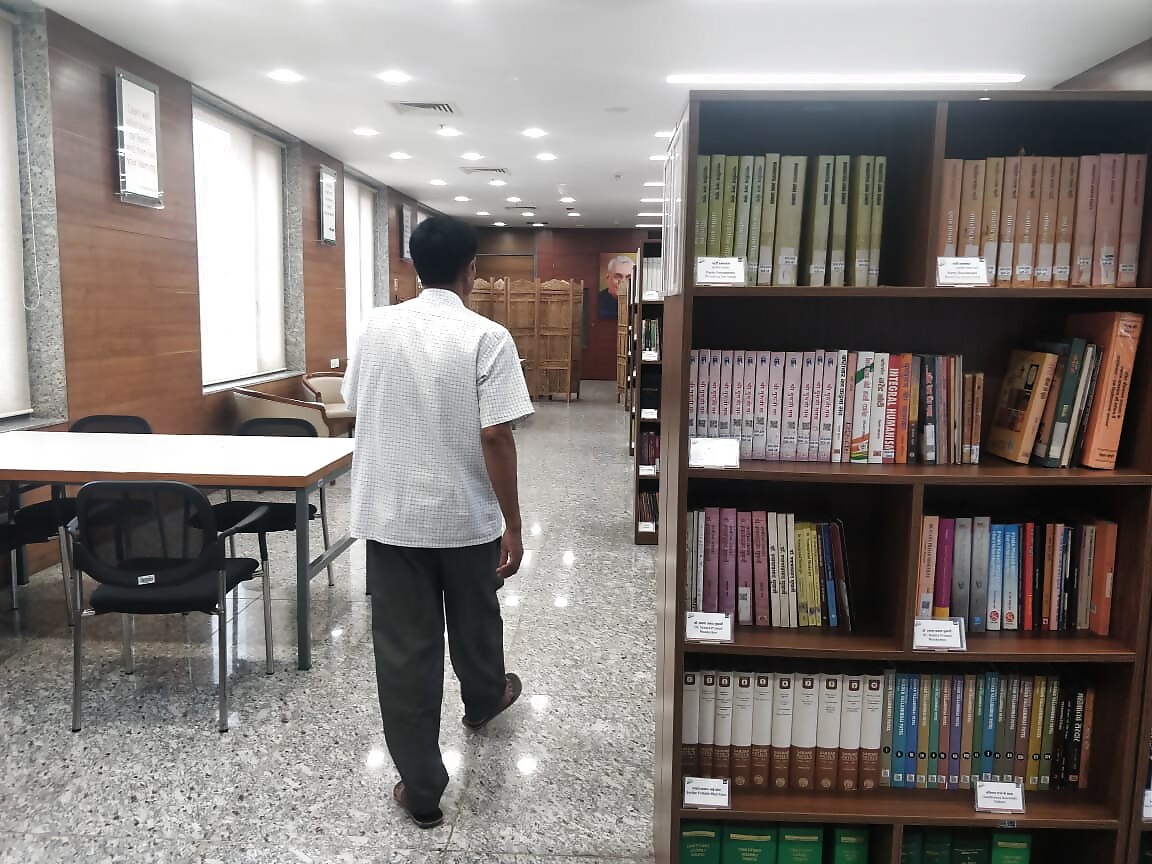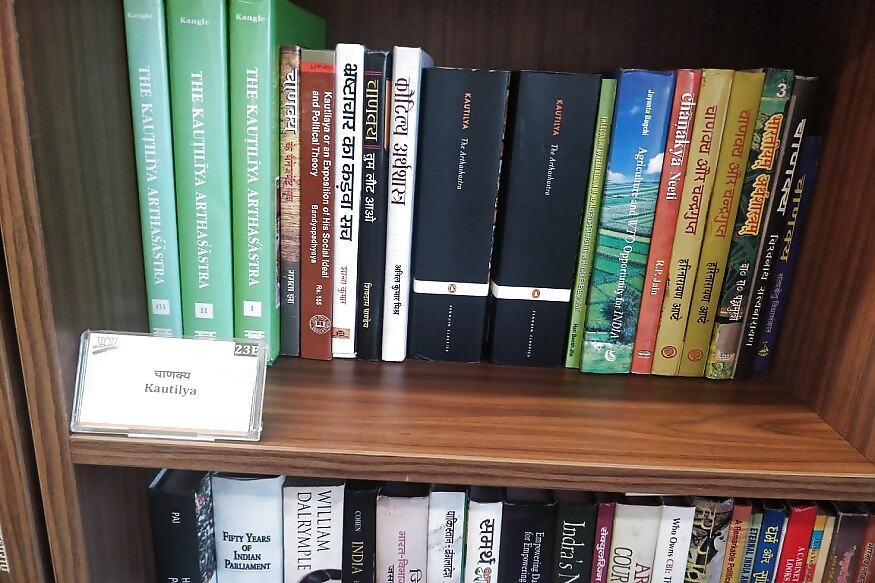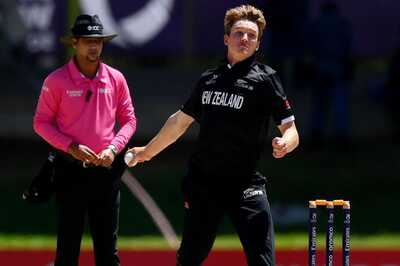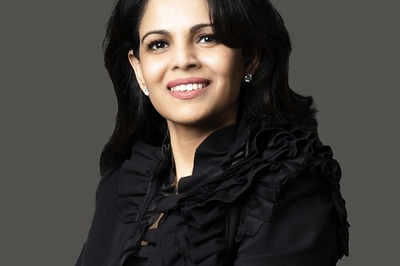
views
New Delhi: As part of its attempt to establish an ideological continuum, the Bharatiya Janata Party (BJP) under Narendra Modi-Amit Shah has embarked on an ambitious project to set up libraries and documentation centres at every party office across the country.
Aimed at imparting a “sense of history” about the party pantheons, the project would seek to make Documentation & Library department as one-stop destination for karyakartas on party doctrine and beliefs.
“The emphasis on library in headquarters and district offices is reflective of the new BJP under Modi-Shah,” says veteran journalist and Indira Gandhi National Centre for Arts (IGNCA) chief Ram Bahadur Rai, who has closely watched the growth of the RSS and the BJP in the last four decades.

A man walks across a shelf of books inside the library.
The Congress and the Left parties have over the years documented and maintained rich archives of their political activities and that of their leaders to provide ideological moorings and a perspective for each passing generation.
In the BJP, the first step towards this goal was taken when space was allocated on the fourth floor of the new BJP headquarters, which was inaugurated last year, at Deendayal Upadhyaya Road in central Delhi. Sections in the library are as diverse as ‘Communism’ and ‘History of Indian National Congress’ to ‘Hindutva’ and ‘Ram Janmabhoomi’, books from which are said to be regularly read by party leaders, including Shah.
Others sections in the library include ‘State Documents’ and ‘Party Documents’ which bring manifestoes and resolutions of the Bharatiya Jana Sangh into the public domain. A collection of books curated by Shah includes Amnesty International Report: The State of The World’s Human Rights, Democracy in America by Alex De Tocqueville and Chhatrapati Shivaji.

Books stacked up in a shelf inside the BJP's library.
The Documentation & Library team has also procured rare documents of the Praja Parishad Movement in Jammu and Kashmir, including works like A Saga of Sacrifices: Praja Parishad Movements in Jammu and Kashmir and 100 Documents, a reference book on Jammu and Kashmir. This collection portrays the struggle of Praja Parishad and Jana Sangh in demolishing the barriers between J&K and the rest of the country.
The volumes on second RSS chief MS Golwalkar, Sri Aurobindo Ghosh, Swami Vivekananda, Sardar Vallabhbhai Patel, SP Mookerjee, Deendayal Upadhyaya and on the Constituent Assembly debates are among the 3,500 books housed in the library. Sections range from ‘Literature’ and ‘Foreign Affairs’ to ‘History’ and ‘Economics’, where authors and essayists like Madhu Limaye, Amartya Sen, Jean Dreze, AG Noorani, PS Krishnan, Arun Shourie, Koenraad Elst and Shivkumar Gupta share the same space.
The Ideological Continuum
The library is co-convened by Anirban Ganguly from the SP Mookerjee Research Foundation. “A library is an important step for a party to have ideological continuum. We are in the midst of ideological debates and reading is a way to articulate our ideological stand better,” he said.
Ganguly is assisted in his task by former journalist Sunil Pandey and former IRS officer Aseervatham Achary, who had helped build the DMK library years ago and blew the lid off the 2G scam.
Talking about the archives of other parties, Ganguly said, “The AICC had the best archives, and libraries in Left party offices were prolific too. We have built on our collection which has our heroes as well as those who differ from us,” added Ganguly.
Ganguly has also co-authored a book with Shiwanand Dwivedi on the BJP chief, titled Amit Shah: And the March of the BJP. In the book, the authors have dedicated a chapter to Shah’s insistence on building libraries at party offices from district-level to the headquarters.
In the chapter, the authors have quoted Shah as saying that it is imperative for workers and leaders of the party to understand that theirs is a political movement, an ideological flow. According to the book, Shah told karyakartas that there exist several ideological dimensions that can be understood only through study and by examining other parties.
“Read and reflect on their history, understand the process of de-ideologisation that they were facing. It is only such a disciplined reading that can gradually make them realise the reasons for the BJP’s continuity despite the many vicissitudes,” Shah is quoted as saying.
The BJP chief is also said to have emphasised that evolution and appreciation of the ideological continuum is of high importance to the new BJP. “If we don’t realise this need for continuously shaping and nurturing the new narrative of India and the aspiration to see it assume her place as Visva Guru, in fifty years we too shall become like Congress,” Ganguly and Dwivedi quote Shah as saying.
The BJP libraries, thus, contribute in ‘Swadhyay Mandals’ where state and national leaders read and reflect to be able to articulate better in Parliament and assemblies.
The 15 libraries opened so far are scattered across states like Arunachal Pradesh, Bihar, Jammu and Kashmir, Karnataka, Madhya Pradesh, Maharashtra and Rajasthan.
Digital Debut
Shah had visited Chhattisgarh capital Raipur to inaugurate the BJP’s digital library, in which the party has uploaded 6,000 e-books. Titles include Prabuddha Bharata, The Imperial Gazetteer of India, The Indian Annual Register and Debates on the First Amendment of the Constitution. The e-library also hosts 657 Tamil books and 430 Kannada ones.
The digital library receives maximum traffic from Chennai, Bengaluru and Pune, with 60% of the total readership coming from mobile phones, 36% from desktops and 4% from iPads and tablets. Internationally, readership mostly comes from US, Malaysia, United Kingdom, UAE, Australia, Germany, Sri Lanka and Singapore.
Svaraj in Ideas by KC Bhattacharya, Vidur Niti and India Divided by Rajendra Prasad are some of the most downloaded books from the e-library.
According to the members of the Documentation & Library department, the message this extensive activity is meant to send is that the BJP is not only an election machine, but works throughout the year, reading and arguing to better its ideological stand.




















Comments
0 comment